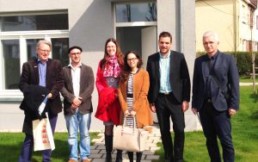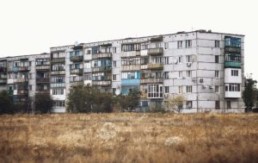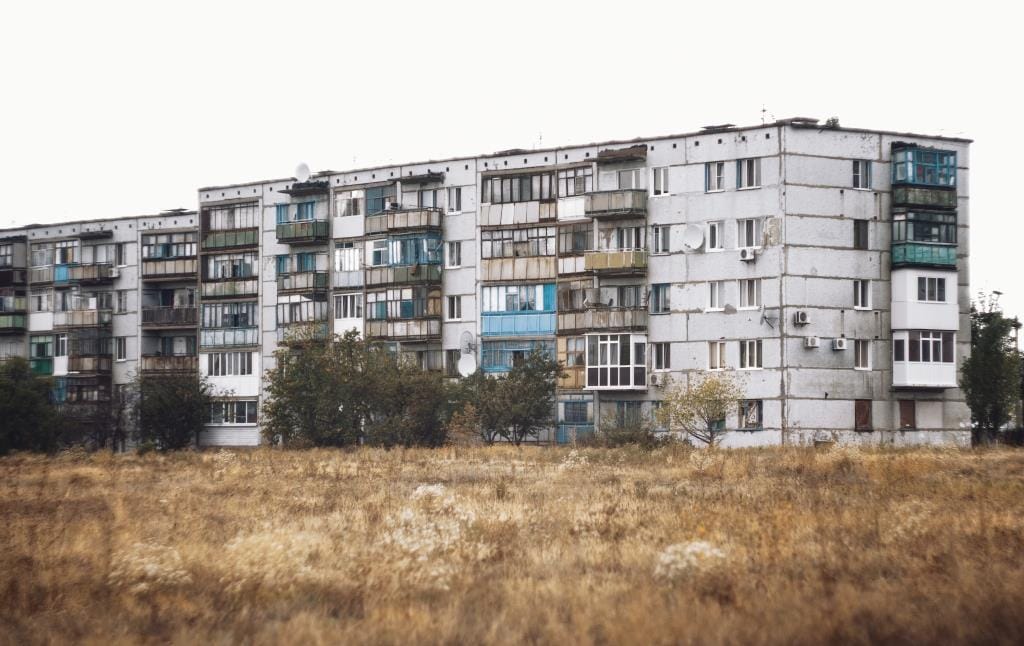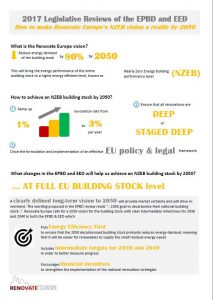France: Where energy efficiency tops the polls
France: Where energy efficiency tops the polls

20th April 2017, by Adrian Joyce, Renovate Europe Campaign Director
Whoever is elected in the French elections, it seems that the building renovations industry will win.
Energy renovation programmes have been a substantial feature in the manifestos of all leading presidential candidates - and in the presidential TV debates.
That means French voters can choose from a range of often detailed energy efficiency programmes, in the first round of polling on April 23. But how did it happen?
“The subject emerged in this campaign because we built a specific alliance to make it emerge,” says Danyel Dubreuil, a spokesperson for the Renovons! (Let’s Renovate!) campaign.
A popular front of housing associations, green groups, private companies, France's biggest trades union and even Catholic networks helped transform state support for energy renovations into a consensus issue, he contends.
Around one third of housing in France – 7m houses or apartments – is poorly insulated, and energy poverty is a resonant issue with working-class voters coveted by both the left and right.
So who is top of the energy renovation pops?
According to Renovons!, which has prepared a handy guide to the positions of the leading candidates, the number one spot goes to Benoît Hamon, the socialist candidate who has promised a breathtaking €100bn “urban and thermal” renovation plan, involving a €6bn a year set aside to refurbish public buildings and improve energy storage.
This would guarantee that the poorest third of householders spend no more than 10% of their annual income on energy, Hamon says.
Close on his tail is Jean-Luc Mélenchon, who has pledged to insulate 700,000 housing units a year, imposing new energy renovation obligations - and associations - while establishing a one-stop shop for financing, needs assessments and coordination of refurbishments.
The front-runner in many polls, Emmanuel Macron, offers a less ambitious but better-costed €4bn programme to renovate public buildings. If elected, he has vowed to scrap a one year delay to new applications for France's energy transition tax credit scheme, introduce free efficiency audits, and set up a target to renovate half of the poorest and smallest dwellings by 2022.
On the right of the political spectrum, François Fillon promises to continue the current government's renovation assistance programmes, to “amplify” energy saving policies, and to “generalise” energy assessments of buildings.
Even the far-right Marine Le Pen has a minor manifesto pledge (number 132) to make insulation a “budgetary priority” in public procurement policy.
One key underlying reason for the increased interest in renovations is France's energy transition law, which sets a target for renovating all buildings with 'F' and 'G' energy classes by 2025.
But Dubreuil argues that energy renovations are also becoming this election's environmental touchstone because they are a potential vote-winner with no polarising or conflictual undertones.
“It is a good thing to see that the political consensus is now so large and powerful,” he said. “It was not this clear before and I think it is a very good result of our campaign. The question is: how will it be transformed into a concrete and complete plan in the next five years?”
As manifesto-drafters get to work in the UK and Germany, another question might be: How long it will take for this French election lesson to spread across Europe?
END
Learn more about Renovate Europe's National Supporting Partner in France, and about the Renovons Campaign.
Op-ed: Energy poverty: A blight on the EU (Euractiv)
Published by Euractiv on: 6 April 2017 | For something that blights the lives of between 50 and 125 million European citizens it is strange to discover that there is no EU-wide definition of ‘energy poverty’, writes Adrian Joyce.
Making it Real - Site to Renovated House with Energy Attachés
The Renovate Europe office organised a site visit for Energy Attachés to the Renovactive house in Anderlecht on Wednesday 29th March.
The RenovActive house is a demonstration project of VELUX, a partner of the Renovate Europe Campaign. A typical 1920s house in the Brussels suburb was fully renovated with the double aim of significantly reducing energy consumption but also of improving the daylight and fresh air for future inhabitants. The fact that the house is part of a social housing estate meant that costs had to be kept within a restricted budget, in cooperation with the local social housing authority, and that the project has very strong replicability potential to neighbouring houses. This is an excellent example of how to maximise the untapped energy efficiency potential of the EU building stock for the benefit of EU citizens and families, in terms not only of reduced energy bills but also improved health and comfort.
Relevant documents:
- Renovate Europe Presentation: How to reduce the energy demand of the building stock by 80% - the example of the RenovActive House
- Velux Presentation of Renovactive: a healthy and affordable concept
- Legislative Reviews of the EPBD and EED: How to make Renovate Europe's NZEB vision a reality by 2050
- Renovate Europe Briefing 1/2017 about Energy Poverty
- Renovate Europe one-pager: Why is Energy Renovation the Long-term Solution to Improved Health?
- Renovate Europe one-pager: Why is a thriving Energy Renovation Market essential to drive the EU Economy?
More about project: https://renovactive.velux.be/fr/la-maison/architecture/
Interview about the Dutch National Elections 2017
Interview about the Dutch National Elections 2017

Interview with the Renovate Europe Dutch National Partner - the National Renovation Platform
How did energy renovation feature in the Dutch national elections?
Strangely enough there was all but no attention towards energy-efficiency and climate in the weeks and days before the elections. Could it be, that the political leaders thought, that that was of no interest to the Dutch voters? Or could it be that they wanted to avoid the subject, due to the huge financial impact it's going to have in the coming years? The latter seems to be more probable, since so many people in the Netherlands have deep concerns about climate and energy in the future. Especially young people have taken a considerable interest in the matter.
How did NRP contribute to the debate?
NRP Spaar het Klimaat focused on the political leaders and worked to organise two political debates to raise attention around energy efficiency in buildings among candidates for the new parliament. It also focused on raising support for candidates who declared their support to stop energy waste in buildings. The campaign website was launched and approximately 100 000 followers on twitter and facebook were informed. 8 candidates of 6 political parties (CDA, PvdA, D66, Greenleft, ChristenUnion) signed the declaration.
On 25-2-2017 we hosted the first political debate, in cooperation with football club SC Heerenveen with 7 candidates for the Parliament: VVD, PvdA, CDA, D66, Greenleft, ChristenUnion and 50Plus. Following the success of this debate we scheduled the second debate on 12-3-2017 in Amsterdam in cooperation with the Amsterdam Arena. Due to the fact that a debate on this issue was clearly, in the end, not in the interest of all political parties, it was called off a few days before the debate by withdrawal of one of the leaders. An argument that was used at that moment, was that the issue of climate change was part of the last public debate on television.
How do you think the new government will tackle energy renovation?
Traditionally the Association of Employers in the Netherlands contribute publicly and with great influence on national political matters. They have chosen to demand a "green agenda" for the next government. In their motivation there are lots of words about the positive economic impact of such a choice and especially where building and renovation of real estate is at stake. It's likely that this will have an impact on the political agenda.
Although almost absent in the Dutch political debate, in the written and agreed programs of the respective political parties, energy and sustainability, are important chapters with detailed plans and goals. That's why I anticipate a thorough discussion on the "green subjects" in the formation of a new government, now the elections are over. That's unavoidable, because all parties seem to take the Kyoto-Paris obligations about the climate very seriously.
END
Briefing 1/2017 on Energy Poverty - Nobody should have to choose between heating and eating
Briefing 1/2017: Energy Poverty - Nobody should have to choose between heating and eating
Energy poverty is as widespread as it is devastating for those who suffer it. Countries with the poorest building stock have the highest rates of excess winter mortality. EU legislation requires all countries to define vulnerable customers in their energy market so they can be helped, but two thirds of the Member States have not yet done so. The public health consequences are as grievous as they are unnecessary.
Definition: What's in a name?
For a blight on the lives of between 50m and 125m European citizens it is odd to discover that there is no agreed EU definition of 'energy poverty'. The European Commission has suggested tagging it to households which spend twice as much as the average share of their income on energy products, or households that have difficulties in paying their energy bills.
The causes are everywhere the same: low wages, high energy bills, low quality and poor performing buildings
Around 54 million Europeans cannot afford to heat their homes in winter, and the same number are either behind with their electricity and gas bills, or live in damp and leaky homes. These problems are worst in central and eastern Europe - affecting 73% of Bulgarians, for example – but is also rife in countries such as the UK and Ireland.
The causes are everywhere the same: low wages, high energy bills, low quality and poor performing buildings. As energy prices continue to rise, and the impacts of austerity continue to be felt, this picture is unlikely to brighten without focused remedial action.
The European Parliament's S&D Group has proposed the following form of words: “Energy poverty is the inability of a household to support an adequate level of energy supply so as to guarantee basic levels of comfort and health, due to a combination of low income, high energy prices and low quality, poor performing housing stock.”
The invisible health hazard
From the elderly dying alone in winter to middle-aged workers with respiratory diseases and children struggling with asthma, energy poverty is a burden on the poor, and on us all.
Studies attribute between 30-50% of excess winter mortality to poor housing conditions. In Liverpool alone, a 2013 survey implicated energy poverty in 500 deaths and around 5,000 illnesses requiring medical attention. Those who spent the most time at home – single parents, the elderly and the very young, the sick and the unemployed – suffered the greatest risk.
Poor housing standards are a major contributory factor to ill health
Across Europe, a similar picture emerges. Countries with the poorest housing status - Portugal, Greece, Ireland and the UK – have the highest excess winter mortality rates. Positive correlations between winter deaths and environmental temperatures, coupled with negative links to thermal efficiency, indicate that poor housing standards are a major contributory factor to ill health. Given that close to 75% of homes in the EU are not energy efficient, there is a lot of work to be done.
Solutions: Three case studies
In Lithuania, where a third of people cannot adequately heat their homes, €100m of funding has been used to leverage €500m of bank loans to renovate 80,000 homes – and lift 200,000 people out of energy poverty. The refurbishment plan works by offering homeowners grants for 35-40% of renovation costs – or 100% for low income families – with the remainder financed by low interest loans. By the early 2020s, over 3,500 apartment blocks should have been renovated, and householders' energy use slashed by around one half. The success of the programme in the 2013-2015 period led Lithuania to extend it to municipal public buildings.
Free Ikea kitchens for tenants proved the unlikely selling point of the Energiesprong project in The Netherlands, which has a contract to renovate 110,000 homes built in the 1960s and 70s. The revamp is being paid by an estimated €6bn of energy bill savings for participating Dutch housing associations, under-written by government guarantees over a 40-year period. The renovated buildings are nearly emissions free, wrapped in insulated panel-facades, their insulated roofs each adorned with 24 high-efficiency solar panels. Heat pumps, hot water storage tanks and ventilation units complete the picture. So far, around 1,300 Dutch homes have received an Energiesprong makeover, and two French pilot projects will be launched by the end of the year.
Romanians still substantially live in energy-leaking Soviet-era housing blocks but a €304m project is trying to plug the gaps. Households earning less than €500 a month were targeted in a scheme to refurbish 65,000 apartments. With the help of co-financing from the ERDF, 60% of building costs were covered, leaving tenants liable for just 10-40% of the expenses, through their owners' associations. Walls and roofs were insulated, double-glazed windows installed, and communal heating systems improved. The project should cut heat-related energy consumption for beneficiaries by around 40%, and create 5,000 jobs.
Policy: Demanding the possible
All EU citizens should be able to live in decent housing that does not damage their health, social life, wellbeing or life chances. The key to doing so is sustained energy efficiency programmes which are focused on vulnerable households with simplified access to favorable financing and independent, supporting advice. A good first step would be to target this group with tailored renovation programmes under Article 7 of the Energy Efficiency Directive and within the long-term renovation strategies in the EPBD. Additional funds to help solve this challenge could be allocated as part of a revision of the EU Structural Development Funds, especially the Regional Development Fund.
Energy prices and network charges are likely to continue to increase. Member States' climate change policies have so far been largely funded through utility bills, which increase the risk of energy poverty for vulnerable customers. Unless strong energy efficiency policies targeting the worst-performing buildings are established as a legal demand in the EU legislation we are unlikely to find sustainable long-term solutions that can alleviate energy poverty on a large scale.
Download the Renovate Europe Briefing 1/2017: Energy poverty - nobody should have to choose between heating and eating
Read the Renovate Europe Oped on Energy Poverty on Euractiv: Energy Poverty - A Blight on the EU
2017 Legislative Reviews: How to make Renovate Europe's NZEB vision a reality by 2050?
What is the Renovate Europe vision and what changes in the EPBD and EED will help us achieve an NZEB building stock by 2050?
Download the Renovate Europe 2-pager.













